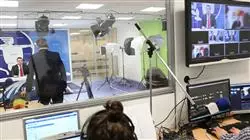University certificate
The world's largest faculty of journalism and communication”
Why study at TECH?
This program in Television Journalism will allow you to develop all your knowledge of the creation and broadcasting of stories in a professional way"

Journalism studies are one of the most demanded in all universities, since this profession has a great influence on the population and has gained great prominence since its beginnings. Journalism encompasses different branches: social, cultural, economic, sports, international, events, conflicts, etc. This makes it necessary for professionals in this sector to specialize in order to tell stories in the most appropriate way in each case.
Additionally, the transmission of information can be carried out through different media. Specifically, this program aims to specialize students in Television Journalism. To do so, it is necessary to acquire a series of skills that allow you to put into practice all that has been learned.
The syllabus addresses the audiovisual narrative, essential for the development of any information in this medium. And, as it could not be otherwise, focuses on communication and Television Journalism, in order to delve students into all the particularities of this field.
This program is the most complete and directed so that the professionals in the field of Journalism and communication reach a superior level of performance, based on the fundamentals and the latest trends in Television Journalism.
Work with the best teaching professionals in this Postgraduate diploma with curricular value of excellence”
This Postgraduate diploma in Television Journalism contains the most complete and up-to-date program on the market. The most important features include:
- The development of case studies presented by experts in television journalism
- The graphic, schematic, and practical contents with which they are created provide scientific and practical information on the disciplines that are essential for professional practice
- News on Television Journalism
- Practical exercises where the self-assessment process can be carried out to improve learning
- Its special emphasis on innovative methodologies in television journalism
- The interactive learning system based on algorithms for decision-making on the situations posed in Television Journalism
- Theoretical lessons, questions to the expert, debate forums on controversial topics, and individual reflection assignments
- Content that is accessible from any fixed or portable device with an Internet connection
This Postgraduate diploma is perfect for you to learn how to tell the story you want to tell and do it in a professional way”
Its teaching staff includes professionals from the world of journalism, who bring to this program the experience of their work, as well as renowned specialists from prestigious reference societies and universities.
Its multimedia content, developed with the latest educational technology, will enable the professional to contextual and situated learning, i.e., a simulated environment that will provide immersive learning programmed to prepare in real situations.
This program is designed around Problem-Based Learning, whereby the professional must try to solve the different professional practice situations that arise throughout the program. To do so, the professionals will be assisted by an innovative interactive video system developed by renowned and experienced experts in the field of Television Journalism.
Don't miss the opportunity to increase your competence in Television Journalism"

Know the latest trends in Television Journalism and be the best in this sector"
Syllabus
विषय-वस्तु की संरचना पत्रकारिता के पेशेवरों की एक टीम द्वारा तैयार की गई है, जो शिक्षा की वर्तमान प्रासंगिकता के प्रति सजग हैं, ताकि ज्ञान के क्षेत्र में गहराई से जाकर, उपलब्ध नए उपकरणों के माध्यम से पेशेवर गुणवत्ता वाला कार्य किया जा सके।

टेलीविज़न पत्रकारिता में इस स्नातकोत्तर डिप्लोमा में बाज़ार में सबसे पूर्ण और अद्यतन शिक्षण कार्यक्रम शामिल है”
मॉड्यूल 1. ऑडियोविजुअल कथा
1.1. ऑडियोविजुअल आख्यान
1.1.1. परिचय
1.1.2. ऑडियोविजुअल आख्यान की मूलभूत अवधारणाएँ
1.1.3. एक प्रणालीगत दृष्टिकोण
1.1.4. ऑडियोविजुअल प्रवचन की विशिष्टताएँ
1.1.5. ऑडियोविजुअल भाषा
1.1.6. छवि
1.1.7. आवाज़
1.2. प्रवचन और उच्चारण के चरण
1.2.1. परिचय
1.2.2. आख्यान के कार्य
1.2.3. आख्यान पाठ का निर्माण
1.2.4. उच्चारण के उदाहरण
1.2.5. कथावाचकों की टाइपोलॉजी
1.2.6. फ़ोकलाइज़ेशन
1.2.7. कथावाचक
1.3. कहानी और कथा की धुरी
1.3.1. परिचय
1.3.2. इतिहास
1.3.3. कथात्मक क्रिया
1.3.4. टाइम
1.3.5. अंतरिक्ष
1.3.6. आवाज़
1.4. ऑडियोविजुअल प्रवचन का निर्माण: स्क्रिप्ट
1.4.1. परिचय
1.4.2. स्क्रिप्ट
1.4.3. विचार
1.4.4. शैलियाँ
1.4.4.1. शानदार और डरावनी फ़िल्में
1.4.4.2. युद्ध फ़िल्में
1.4.4.3. हास्य फ़िल्में
1.4.4.4. संगीतमय
1.4.4.5. वृत्तचित्र
1.4.5. पात्र और संवाद
1.4.6. साहित्यिक पटकथा बनाम तकनीकी पटकथा
1.5. फिल्म संपादन का सिद्धांत और विश्लेषण
1.5.1. परिचय
1.5.2. असेंबली परिभाषा
1.5.3. फिल्म कथा की मूल इकाइयाँ
1.5.4. पहला सैद्धांतिक दृष्टिकोण
1.5.5. असेंबल के प्रकार
1.5.6. अदृश्य असेंबली: रैकॉर्ड। माउंटिंग पर शब्दावली
1.6. सिनेमैटोग्राफिक कथन: मूल से लेकर उत्तर-आधुनिकता तक।
1.6.1. परिचय
1.6.2. सिनेमा की उत्पत्ति
1.6.3. मूल का सिनेमा: स्पेस-टाइम आर्टिक्यूलेशन
1.6.4. अवंत-गार्डे और सिनेमा
1.6.5. हॉलीवुड सिनेमा
1.6.6. कला सिनेमा और निबंध
1.6.7. समकालीन सिनेमा
1.7. कंप्यूटर सिनेमा: न्यूज़रील से डॉक्यूमेंट्री तक
1.7.1. परिचय
1.7.2. सूचनात्मक सिनेमा
1.7.3. सिनेमैटोग्राफिक न्यूज़रील
1.7.4. वृत्तचित्र
1.7.5. सूचनात्मक फिक्शन सिनेमा
1.7.6. ऐतिहासिक स्रोत के रूप में न्यूज़रील का महत्व
1.8. टेलीविज़न चर्चा: सूचना और मनोरंजन
1.8.1. परिचय
1.8.2. टेलीविज़न चर्चा
1.8.3. ऑडियोविजुअल सूचना की कथा-कथन
1.8.4. ऑडियोविजुअल सूचना शैलियाँ
1.8.5. इन्फोटेनमेंट
1.8.6. मनोरंजन कार्यक्रम
1.8.7. फिक्शन टेलीविज़न स्टोरीटेलिंग
1.9. ऑडियोविजुअल विज्ञापन चर्चा: स्पॉट, ट्रेलर और वीडियो क्लिप
1.9.1. परिचय
1.9.2. ऑडियोविजुअल मीडिया में विज्ञापन कथा
1.9.2.1. स्पॉट
1.9.2.2. ट्रेलर
1.9.2.3. वीडियो क्लिप
1.10. डिजिटल युग में नया मीडिया और कथा संरचनाएँ
1.10.1. परिचय
1.10.2. डिजिटल प्रतिमान
1.10.3. 21वीं सदी का नया मीडिया
1.10.4. नए मीडिया अभ्यास
1.10.5. पोस्ट-मीडिया स्थिति
मॉड्यूल 2. टेलीविजन संचार
2.1. टेलीविज़न पर संदेश
2.1.1. परिचय
2.1.2. टेलीविज़न पर संदेश
2.1.3. गतिशील छवि और ऑडियो के मिलन के रूप में टीवी
2.2. टेलीविजन मीडिया का इतिहास और विकास
2.2.1. परिचय
2.2.2. टेलीविजन माध्यम की उत्पत्ति
2.2.3. टेलीविजन मीडिया की दुनिया में इतिहास और विकास
2.3. टेलीविजन शैलियाँ और प्रारूप
2.3.1. परिचय
2.3.2. टेलीविजन शैलियाँ
2.3.3. टेलीविजन पर प्रारूप
2.4. टेलीविजन पर स्क्रिप्ट
2.4.1. परिचय
2.4.2. स्क्रिप्ट के प्रकार
2.4.3. टेलीविजन में स्क्रिप्ट की भूमिका
2.5. टेलीविजन प्रोग्रामिंग
2.5.1. परिचय
2.5.2. इतिहास
2.5.3. ब्लॉक प्रोग्रामिंग
2.5.4. क्रॉस प्रोग्रामिंग
2.5.5. काउंटरप्रोग्रामिंग
2.6. टेलीविजन में भाषा और कथन
2.6.1. परिचय
2.6.2. टेलीविज़न में भाषा
2.6.3. टेलीविज़न कथन
2.7. भाषण और अभिव्यक्ति तकनीक
2.7.1. परिचय
2.7.2. भाषण तकनीक
2.7.3. अभिव्यक्ति तकनीक
2.8. टेलीविज़न में रचनात्मकता
2.8.1. परिचय
2.8.2. टेलीविज़न में रचनात्मकता
2.8.3. टेलीविज़न का भविष्य
2.9. प्रोडक्शन
2.9.1. परिचय
2.9.2. टेलीविज़न उत्पादन
2.9.3. प्री-प्रोडक्शन
2.9.4. उत्पादन और रिकॉर्डिंग
2.9.5. पोस्ट-प्रोडक्शन
2.10. टेलीविज़न में डिजिटल प्रौद्योगिकी और तकनीक
2.10.1. परिचय
2.10.2. टेलीविज़न में तकनीक की भूमिका
2.10.3. टेलीविज़न में डिजिटल तकनीक
मॉड्यूल 3. टेलीविजन पत्रकारिता
3.1. न्यूज़रूम का संस्था और समाचार कवरेज
3.1.1. परिचय
3.1.2. टेलीविज़न न्यूज़रूम में संस्था
3.1.3. पोस्ट
3.1.4. समाचार कवरेज
3.2. गैर-दैनिक समाचार
3.2.1. परिचय
3.2.2. गैर-दैनिक समाचार
3.2.2.1. सप्ताहांत समाचार कार्यक्रम
3.2.2.2. खास समाचार कार्यक्रम
3.3. दैनिक समाचार कार्यक्रम
3.3.1. परिचय
3.3.2. दैनिक समाचार कार्यक्रम
3.3.3. समाचार कार्यक्रमों के प्रकार
3.3.3.1. हाइलाइट्स
3.3.3.2. दैनिक समाचार कार्यक्रम
3.3.3.3. टॉक शो
3.3.3.4. इन्फोटेनमेंट
3.4. क्रॉनिकल, रिपोर्ट और साक्षात्कार
3.4.1. परिचय
3.4.2. क्रॉनिकल
3.4.3. रिपोर्ताज के प्रकार
3.4.4. साक्षात्कार के प्रकार
3.5. अध्ययन नोडिंग
3.5.1. परिचय
3.5.2. अध्ययन नोडिंग
3.5.3. ऑडियोविजुअल प्रवेश
3.6. प्रारूप के अनुसार कार्यक्रम पत्रिकाएँ और रियलिटी शो
3.6.1. परिचय
3.6.2. पत्रिका की परिभाषा
3.6.3. रियलिटी शो की परिभाषा
3.7. विषय-वस्तु के अनुसार विशेष कार्यक्रम
3.7.1. परिचय
3.7.2. विशेष पत्रकारिता
3.7.3. विशेष कार्यक्रम
3.8. टेलीविज़न उत्पादन
3.8.1. परिचय
3.8.2. टेलीविज़न उत्पादन
3.8.3. प्री-प्रोडक्शन
3.8.4. फिल्मांकन
3.8.5. प्राप्ति का नियंत्रण
3.9. लाइव और स्थगित सूचना का उपचार
3.9.1. परिचय
3.9.2. लाइव सूचना का उपचार
3.9.3. स्थगित सूचना का उपचार
3.10. संपादन तकनीक
3.10.1. परिचय
3.10.2. टेलीविज़न संपादन तकनीक
3.10.3. संपादन के प्रकारएडिटंग के प्रकार

आपके पेशेवर विकास को बढ़ावा देने के लिए एक अद्वितीय, महत्वपूर्ण और निर्णायक शैक्षाणिक अनुभव”
Postgraduate Diploma in Television Journalism.
Television journalism is the production and transmission of news through television. It is a format of journalism that is used to report on current events, notable happenings, relevant events and any other type of information that is considered important to society.
Television journalism focuses on visual and audio presentation of news, which gives it a different approach than print journalism or online journalism. In this format, journalists use live video footage or prerecorded recordings, archival footage, interviews and other visual and audio resources to tell stories and report news.
This type of journalism is also characterized by immediacy, as television can transmit news instantly, in real time, allowing people to be aware of what is happening in the world at that moment. In addition to being an important source of information, television journalism also seeks to entertain and captivate its audience, so it often uses attractive and emotional production and presentation techniques to keep the viewer's interest. However, it should be noted that television presentation should not lead to misinformation or lack of journalistic rigor in the news content.
TECH the world's largest digital university has an academic program designed to provide students with the skills and knowledge necessary to produce and broadcast television news professionally, ethically and efficiently. Students learn to make a critical evaluation of television messages, knowing the editing and production techniques used in the medium and the tools by which the quality of information can be determined. This program is aimed at journalists and other communication professionals who wish to specialize or broaden their knowledge in the field of television journalism.







